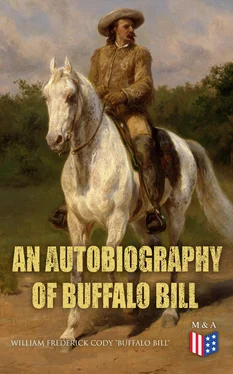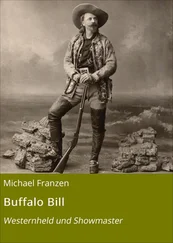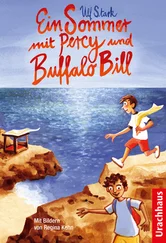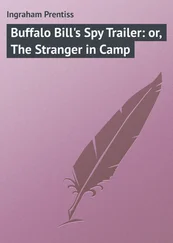Kit Carson, Jim Bridger, Baker, Richards and other of the celebrated hunters, trappers and Indian fighters were as familiar about the post as are bankers in Wall Street. All these men fascinated me, especially Carson, a small, dapper, quiet man whom everybody held in profound respect.
I used to sit for hours and watch him and the others talk to the Indians in the sign language. Without a sound they would carry on long and interesting conversations, tell stories, inquire about game and trails, and discuss pretty much everything that men find worth discussing.
I was naturally desirous of mastering this mysterious medium of speech, and began my education in it with far more interest than I had given to the "three R's" back at Salt Creek. My wagon-beds became splendid playhouses for the Indian children from the villages, who are very much like other children, despite their red skins.
I joined them in their games, and from them picked up a fair working knowledge of the Sioux language. The acquaintance I formed here was to save my scalp and life later, but I little suspected it then.
I spent the summer of '58 in and about Laramie. I was getting to be a big, husky boy now, and felt that I had entered on what was to be my career—as indeed I had.
In January, '59, Simpson was ordered back to Missouri as brigade train-master of three wagon-trains, traveling a day apart. Because of much travel the grass along the regular trail was eaten so close that the feed for the bulls was scanty.
Instead of following the trail down the South Platte, therefore, Simpson picked a new route along the North Platte. There was no road, but the grass was still long, and forage for the cattle was necessary.
We had accomplished about half our journey with no sign of hostile Indians. Then one day, as Simpson, George Woods and I were riding ahead to overtake the lead train, a party of Sioux bore down on us, plainly intent on mischief. There was little time to act. No cover of any kind was to be had. For us three, even with our rifles, to have stood up against the Sioux in the open would have been suicide. Simpson had been trained to think quickly. Swinging the three mules so that they formed a triangle, he drew his six-shooter and dropped them where they stood.
"Now there's a little cover, boys," he said, and we all made ready for the attack.
Our plan of defense was now made for us. First rifles, then, at closer quarters, revolvers. If it came to a hand-to-hand conflict we had our knives as a last resort.
The Sioux drew up when they saw how quickly Simpson's wit had built a barricade for us. Then the arrows began to fly and among them spattered a few bullets. We were as sparing as possible with our shots. Most of them told. I had already learned how to use a rifle, and was glad indeed that I had. If ever a boy stood in need of that kind of preparedness I did.
Down came the Indians, with the blood-curdling yell which is always a feature of their military strategy. We waited till they got well within range. Then at Simpson's order we fired. Three ponies galloped riderless over the prairie, and our besiegers hesitated, then wheeled, and rode out of range. But our rest was short. Back they came. Again we fired, and had the good fortune to stop three more of them.
Simpson patted me encouragingly on the shoulder. "You're all right, Billy!" he said, and his praise was music to my ears.
By this time our poor dead mules, who had given their lives for ours, were stuck full of arrows. Woods had been winged in the shoulder. Simpson, carefully examining the wound, expressed his belief that the arrow which inflicted it had not been poisoned.
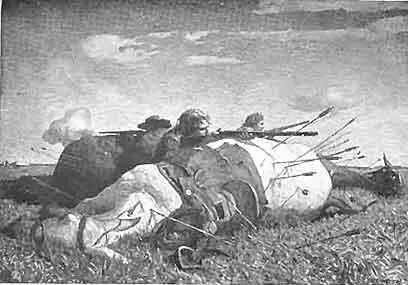
A Shower of Arrows Rained On Our Dead Mules From the Closing Circle of Red-Men.
But we had little time to worry about that or anything else. Our enemies were still circling, just out of range. Here and there when they grew incautious we dropped a man or a pony. But we were still heavily outnumbered. They knew it and we knew it. Unless help came it was only a question of time till it was all over.
Daylight came and they still held off. Eagerly we looked to the westward, but no wagon-train appeared. We began to fear that something had happened to our friends, when, suddenly one of the Indians jumped up, and with every evidence of excitement signaled to the others. In an instant they were all mounted.
"They hear the crack of the bull-whip," said Woods.
He was right. Without another glance in our direction the Sioux galloped away toward the foot-hills, and as they disappeared we heard the welcome snap of the long bull-whip, and saw the first of our wagons coming up the trail. In that day, however, the plainsman was delivered out of one peril only to be plunged into another. His days seldom dragged for want of excitement.
When we got to Leavenworth, Simpson sent three of us ahead with the train-book record of the men's time, so that their money would be ready for them when they arrived at Leavenworth.
Our boss's admonition to ride only at night and to lie under cover in daytime was hardly needed. We cared for no more Indian adventures just then.
We made fairly good progress till we got to the Little Blue, in Colorado. It was an uncomfortable journey, finding our way by the stars at night and lying all day in such shelters as were to be found. But the inconvenience of it was far preferable to being made targets for Indian arrows.
We were sheltered one night from one of the fearful prairie blizzards that make fall and winter terrible. We had found a gulley washed out by an autumn storm, and it afforded a little protection against the wind. Looking down the ravine I saw ponies moving. I knew there were Indians near, and we looked about for a hiding-place.
At the head of the ravine I had noticed a cave-like hollow. I signaled to the two men to follow me, and soon we were snug in a safe hiding-place. As we were settling down to rest one of the men lit his pipe. As the cave was illuminated by the glow of the match there was a wild yell. I thought all the Indians in the world had jumped us. But the yell had come from my companions.
We were in the exact center of the most grew-some collection of human skulls and bones I have ever seen. Bones were strewn on the floor of the cave like driftwood. Skulls were grinning at us from every corner of the darkness. We had stumbled into a big grave where some of the Indians had hidden their dead away from the wolves after a battle. It may be that none of us were superstitious, but we got out of there in a hurry, and braved the peril of the storm and the Indians as best we could.
I was a rich boy when I got to Leavenworth. I had nearly a thousand dollars to turn over to my mother as soon as I should draw my pay. After a joyful reunion with the family I hitched up a pair of ponies, and drove her over so that she could witness this pleasing ceremony. As we were driving home, I heard her sobbing, and was deeply concerned, for this seemed to me no occasion for tears. I was quick to ask the reason, and her answer made me serious.
"You couldn't even write your name, Willie," she said. "You couldn't sign the payroll. To think my boy cannot so much as write his name!"
I thought that over all the way home, and determined it should never happen again.
In Uncle Aleck Majors' book, "Seventy Years on the Frontier," he relates how on every wagon-sheet and wagon-bed, on every tree and barn door, he used to find the name "William F. Cody" in a large, uncertain scrawl. Those were my writing lessons, and I took them daily until I had my signature plastered pretty well over the whole of Salt Creek Valley.
Читать дальше
